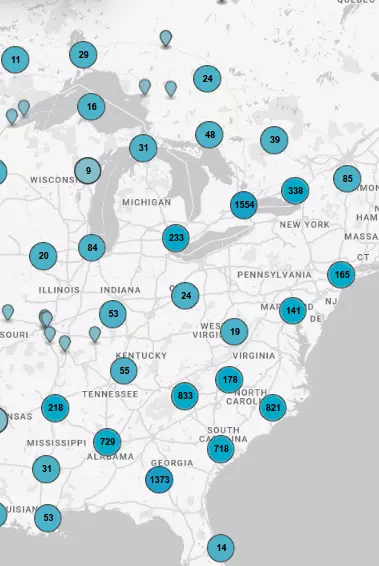St. Benedict the Moor Catholic Church ~ Mother Church of Black Catholics in Georgia
Mother Church of Black Catholics in Georgia In May 1874 two Benedictine priests arrived in Savannah to work with the city´s African-American community, and constructed a church four blocks north...
- lat34
Washington's Southern Tour
During his Southern tour of 1791, President George Washington attended services at the original Christ Church on Sunday, May 15. While in Savannah from May 12-15, Washington lodged at a house...
- lat34
Largest Slave Sale in Georgia History: The Weeping Time
One of the largest sales of enslaved persons in U.S. history took place on March 2-3, 1859, at the Ten Broeck Race Course ¼ mile southwest of here. To satisfy his creditors, Pierce M. Butler...
- lat34
Cathedral of St. John the Baptist
The congregation of St. John the Baptist formed in the late eighteenth century when French émigrés fleeing revolutions in France and Haiti found refuge in Savannah. The Church of St. John...
- lat34
Telfair Hospital for Females
In her will, Mary Telfair (1791-1875) provided for the establishment of a women´s hospital and also named the first president (Louise Gilmer) and six directresses to manage it. Originally located...
- lat34
Johnny Mercer (1909—1976)
World-renowned songwriter John Herndon Mercer was born in Savannah and spent much of his youth in this house at 226 East Gwinnett Street. His lyrics reflected the sounds of Southern...
- lat34
Savannah City Hall
City Hall is the first building constructed by the citizens of Savannah expressly and exclusively to serve as the seat of municipal government. Opened on January 2, 1906, it has served...
- lat34
McKelvey—Powel l Building
The McKelvey-Powell Building was originally constructed in 1926. The building was a hub of African-American business and social life in Savannah during the era of segregation in the first half of...
- lat34
Battery Hamilton
Built by Federal troops during the Civil War, in February 1862, Battery Hamilton prevented Confederate gunboats and reinforcements from moving down the Savannah River to aid the besieged Fort...
- lat34
Sherman's March to the Sea: Battle of Shaw's Bridge and Shaw's Dam
Beginning on December 10, 1864, Union and Confederate soldiers fought near here at Shaw´s Bridge and Shaw´s Dam, as Union General William T. Sherman´s army moved toward Savannah. During bloody...
- lat34
Sandfly
Established by African Americans in the nineteenth century, Sandfly is centered around the intersection of Mongomery Crossroad and Skidaway road. Many families in this community trace...
- lat34
Savannah—Ogeec hee Canal
Chartered in 1842, the Savannah-Ogeechee Canal was constructed between 1826 and 1830 by African and Irish laborers who moved thousands of cubic yards of earth. A boon to Georgia´s economy, the...
- lat34
Joel Chandler Harris in Savannah 1870—1876
Joel Chandler Harris (1845-1908), New South journalist and author of Uncle Remus tales, Free Joe, and many other works, was associate editor of the Savannah Morning News from 1870 until...
- lat34
Florance Street School
Florance Street School was designed by the firm Levy and Clarke and built in 1929 as one of the early public schools in Savannah built specifically for African-American students. It contributed...
- lat34
Savannah's Irish and Robert Emmet Park
Approximately 300 yards northeast of this marker there was located in colonial days a shipyard where at least one vessel capable of engaging in overseas trade was built. The creek on which...
- lat34
Charity Hospital and Training School for Nurses
This was the site of the first hospital in Savannah to train African-American doctors and nurses. Named for Doctors Cornelius and Alice McKane, it began on June 1, 1896, when a small group of...
- lat34
Savannah: Colonial Capital
In March 1750, the Georgia Trustees in London resolved to allow colonists to elect a representative assembly to meet in Savannah, Georgia´s colonial capital. Sixteen delegates met on January 15,...
- lat34
Savannah High School
Savannah High School evolved as the senior division of Chatham Academy, chartered by the Georgia Legislature in 1788. In 1935, due to overcrowding in schools, the Board of Education collaborated...
- lat34
First Baptist Church
First Baptist Church, Savannah´s oldest standing house of worship, was designed by Elias Carter and completed in 1833. The congregation dates to 1800. In 1922 the front of the building was...
- lat34
Forsyth Park
In the 1840s, William Brown Hodgson (1801-1871) conceived the idea of setting aside ten acres of wooded land at this site for development of Savannah´s first recreational park. It was named for...
- lat34
